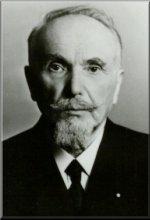- Ivan Regen
Infobox Scientist
name = Ivan Regen
image_size = 180px
caption =
birth_date = birth date|1868|12|9|mf=y
birth_place =Lajše ,Austria–Hungary (nowSlovenia )
death_date = death date and age|1947|7|27|1868|12|9
death_place =Vienna ,Austria
nationality = Slovene
fields =animal physiology ,bioacoustics ,geobiology
alma_mater =University of Vienna
doctoral_advisor =
academic_advisors =Karl Grobben ,Sigmund Exner ,Carl Friedrich Wilhelm Claus
notable_students =
known_for = establishing modern bioacoustics, founding the first geobiology laboratory
influences = Karl Grobben
influenced =
awards =
religion =
footnotes =Ivan (Janez) Regen (known also as Johann Regen) (December 9, 1868 – July 27, 1947) was a
Slovenia nbiologist , known for his studies in the field ofbioacoustics .Regen was born in the village of Lajše (today's
Gorenja vas-Poljane municipality) and became interested ininsect sounds as a child. Due to His family couldn't afford to pay for his schooling, so he studied first at the localseminary for which he received a scholarship, and slowly saved enough funds for the tuition fee in Vienna. There he studiednatural history at theUniversity of Vienna under Grobben, Exner and Claus.cite article |title=Život i rad Ivana Regena |url=http://library.foi.hr/priroda/pregled.aspx?z=80&sql=SDDDDC(C929(DDDDC-DDD-SSDDDC&u= |year=1929 |first=Boris |last=Zarnik |accessdate=2008-09-25 |work=Priroda |issue=1 |page=1-7 |language=Croatian] He received his doctorate in 1897 and began to work as a gymnasium professor, first in Vienna, and later in Hranice (Moravia ). At last he was transferred back to a gymnasium in Vienna after a recommendation from Exner and worked there until his retirement in 1918.In the meantime Regen began his research in
animal physiology , being one of the first Slovenian scientists to work abroad after the nowrap|World War I.cite book |title=Historical overview |work=Science in Slovenia |url=http://www.mszs.si/eng/ministry/publications/science/mzteng/pub/science-dec01/pog1_1.htm |publisher=Republic of Slovenia: Ministry of Education, Science and Sport |first=Marjetka |last=Primožič |year=2001 |accessdate=2008-09-25] With careful observations ofkatydid and cricketstridulation he proved that insects respond to acoustic stimuli from other individuals and was able to provoke his subjects to respond to artificial stimulation using a loudspeaker. Later, he demonstrated that insect hearing depends on intacttympanal organ which was the first description of this organ's function. [cite encyclopedia |url=http://www.britannica.com/EBchecked/topic/555378/sound-reception/64794/Evidence-of-hearing-and-communication-in-insects |title=Sound reception: Evidence of hearing and communication in insects |first=Ernest |last=Glen Wever |encyclopedia=Britannica online |year=2008 |accessdate=2008-09-25] For his contributions he is regarded as the founder of modern bioacoustics. He also studied other physiological phenomena in insects, such asbreathing ,hibernation , the development of pigment under different conditions, andecdysis .Later, he worked in the field of
geobiology and founded the world's first geobiological laboratory.He was a private researcher since 1911, but remained in touch with Slovenia, supporting several local societies and cultural institutions and establishing Slovene terminology for the fields he worked in. In 1921, he declined the invitation to become a professor at the
University of Ljubljana . In 1940, he became an associate member ofSlovenian Academy of Sciences and Arts and was also a honorary member of Slovenian society of natural history.References
Wikimedia Foundation. 2010.
